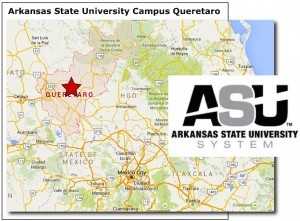Arkansas State University revises financial agreement with sister campus in Queretaro, Mexico
by February 24, 2017 6:14 pm 1,106 views

Arkansas State University’s quest to partner on a project to build an American-style campus in Queretaro, Mexico, may have just become a little more lucrative. The ASU Board of Trustees voted Friday (Feb. 24) to change the funding formula with the ASU-Campus Queretaro or ASUCQ. ASU could net more than $140.592 million from the agreement during the next 20 years, according to estimates.
“As our legal counsel told us, this provides all the protections our university would want and assurances our partner would want,” ASU President Chuck Welch said. “When the original agreement was written, we had not turned a single shovel of dirt. We developed an agreement about what could be, and now this is about what is.”
ASU entered into an agreement in 2014 with an investment consortium to build the nearly $100 million Mexico-based campus. ASU has not spent any money in the creation or development of the campus, Welch said. The consortium’s chief investor Ricardo Gonzalez said he is pleased with the agreement and the businessman wants to leave a lasting legacy in his country.
“Thanks for trusting us,” he said. “We will do everything to make you happy.”
The original agreement stated that ASU would receive $1,600 per student once the enrollment reached 5,000 students. When the school became fully operational, ASU would receive $8 million annually. The problem with the agreement is it didn’t take into account inflation and other factors, ASU Vice President of Strategic Communications Jeff Hankins told Talk Business & Politics.
When the campus opens this fall, it’s expected to have about 1,100 students, and ASU will receive no commission on those, according to the contract obtained by Talk Business & Politics. In 2018, the enrollment is projected to increase to 1,200 and ASU will receive 1% of enrollment fees or $149,828. Each subsequent year the enrollment numbers and commission rates are projected to incrementally increase. It will flat line in year 10 when the enrollment is anticipated to be 5,100 students or more, and the commission rate will then be fixed at 11%.

ASU will construct the college’s curriculum and set its academic programs. ASU-Jonesboro Chancellor Doug Whitlock said there will be minimal cost in designing the programs because they will mirror programs already established by the parent university. ASU will set the tuition fees, hire faculty, and provide licensing and its trademark. It will also provide administrative services on the campus. Students on the campus will graduate as Red Wolves, the school’s mascot. The degrees are valid in the United States and Mexico.
Other changes to the agreement include legal protections for the curriculum provided, the length of the agreement, trademark ownership, and others. The agreement will be in effect for 10 years, but can be extended to 15 years if the projected commission payments are on schedule by the third year. It will be extended to 20 years if by the sixth year the commission projections are met, per the contract. Additional extensions can be negotiated after the 10th year.
The contract can be terminated if ASUCQ doesn’t pay the outlined commissions. It can also be terminated if the security on the campus isn’t adequate, and there are numerous other breaches of contract that could terminate the agreement. If the agreement is terminated, there will be a wind down period. During this time, the name of the school will be changed within 45 days and all references to ASU will be removed.
Queretaro, located in north-central Mexico about 200 miles north of Mexico City, is a technology and industrial hub in the country. At least 1,300 international companies have offices in the city. Gonzalez, who has worked in the banking and food product sectors, partnered with his investors to create an educated workforce to fill the needs of the companies. There is also an impetus by the group to raise education levels and the quality of life in the country.
The college sits on a 370-acre swath and is part of a much larger project envisioned by the investment group. The vision is to build an entire community in the desert with homes, retail shopping markets, parks, and other amenities. The investors hope to attract the best students in the region and provide them with a high quality of life.
Workers are constructing more than 800,000-square-feet of classrooms, dormitories, and other facilities. Degree programs include business, communications, engineering, technology, and science. Other degree programs will be offered once the college is established, officials said.
